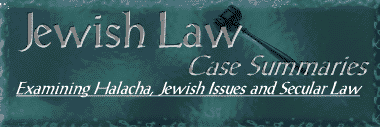

Case Summaries
-- Zoning
Zoning
- LeBlanc-Sternberg v. Fletcher
- Plaintiffs entitled to attorneys’ fees and costs in an action under 42 U.S.C. §§ 1983, 1985, and the Fair Housing Act against the Village incorporated for the purpose of excluding Orthodox Jews; award of nominal damages and dismissal of claims against the individual defendants did not preclude award of substantial fees where significant equitable relief was secured.
143 F.3d 748 (2d Cir. 1998), Docket No. 96-6287. Decided May 13, 1998. Opinion by J. Kearse.
- Smith v. Wisconsin Institute For Torah Study, Inc.
- Yeshiva, religious high school, located in single-family residential district, could construct dormitory as a permitted accessory use; no detrimental effect on neighborhood.
218 Wis.2d 164, 578 N.W.2d 208 (Wis. Ct. App. 1998), No. 96-2922. Dated March 3, 1998. Opinion by J. Cane.
- Grumet v. Pataki
- N.Y. Laws of 1997, chapter 390, allowing municipalities, existing and yet to be formed, to form new school districts, provided an impermissible, unconstitutional religious preference to a Village occupied exclusively by Orthodox Jewish Hasidim desiring to provide their handicapped children with special education services in an exclusive environment.
244 A.D.2d 31, 675 N.Y.S.2d 662 (N.Y. App. Div.1998), aff’d, ___ N.Y.2d ___, ___ N.Y.S.2d ___, ___ N.E.2d ___ (1999).
-
Camp Ramah In The Poconos, Inc. v. Zoning Hearing Board of Worcester Township
- A children's day camp operated by a Jewish organization was permitted in agricultural district under the special exception provided for "recreational" uses so long as it conformed to the 350 foot set back requirement; it did not qualify as a "religious" use to which 150 foot set backs applied even though the camp had an overall religious purpose and even though during some periods of the day the children would engage in solely religious activities; an adult retreat situated on the property did not fit within any of the uses permitted by special exception; even though the retreat center would be used solely by Jewish groups for weekend retreats devoted primarily to prayer and religious instruction and for multi-day instructional programs in Jewish laws, customs and practices, the court likened center to a hotel, rooming house, or tourist house.
743 A.2d 1019 (Pa. Commw. Ct. 2000)
-
Concerned Citizens of Carderock v. Hubbard
- Zoning ordinance designating churches and other places of worship as permitted uses within areas zoned for single-family residential use, thereby exempting such uses from the requirement to obtain a "special exception use permit" did not did not amount to an impermissible endorsement of religion, even though "charitable or philanthropic institutions" and "private clubs" did not enjoy such an exemption; private, unincorporated association of residential owners had standing to raise the issue.
84 F. Supp. 2d 668 (D. Md. 2000)
-
Yeshiva Chofetz Chaim Radin, Inc. v. Village of New Hempstead
- Plaintiffs, a Yeshiva and two Orthodox Jews, alleged that a village and individual village officials violated plaintiffs' free exercise and equal protection rights, as well as various federal Civil Right Laws, the federal Fair Housing Act, and provisions of the N.Y. Constitution and laws, by: (1) selectively enforcing the Village's zoning laws against them because of their religion, (2) engaging in bad faith prosecutions against them and conspiring to do so in violation of federal law; plaintiffs also alleged that the village zoning code was unconstitutional, because it failed to provide for fair housing or multi-family dwellings, despite the need for such housing for individuals who had to live close to places of worship and schools and because it contained provisions, such as requiring special permits for those who wished to have two kitchens in one house, which were intended to burden Orthodox Jews; defendants' motion for summary judgment was denied on all counts of the complaint as their were triable issues of fact on the essential elements of plaintiffs' claims; the individual defendants were not entitled, as municipal officials, to immunity from either the federal or state claims; plaintiffs' claims did not constitute a SLAPP suit governed by New York's procedural law pertaining to motions for summary judgment.
98 F. Supp. 2d 347 (S.D.N.Y. 2000)
